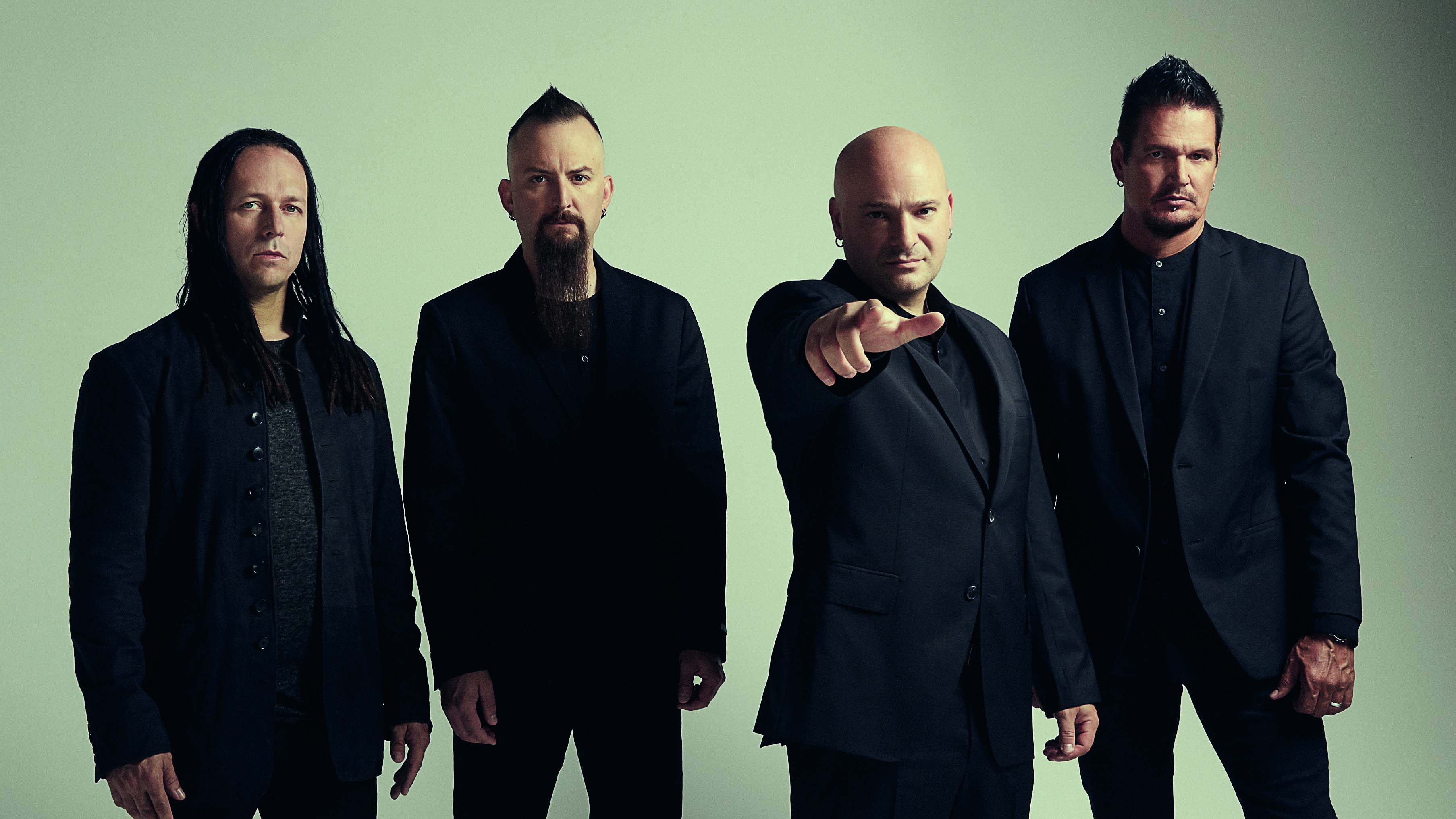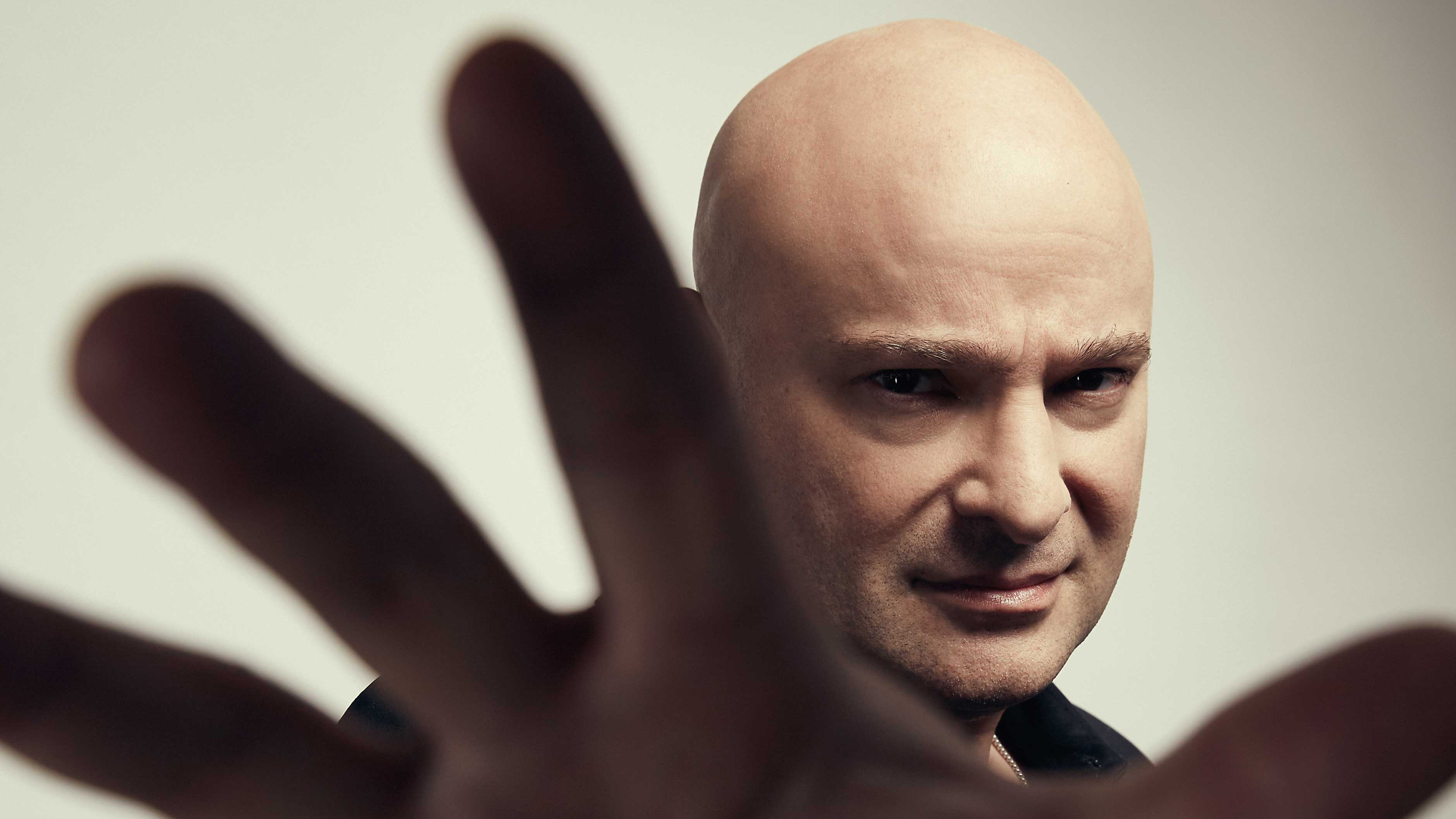David Draiman is staring at us. Not with the chest-beating conviction he channels onstage, but with the nervous expectation of a newborn deer, because we’re about to remind him of some old interview quotes. In 2002, before the release of second album Believe, he was describing the acoustic song Darkness to Metal Hammer when he threatened to “kill anyone who terms it a ballad”.
“Ha ha ha ha ha ha ha!” Today’s David Draiman erupts with laughter, eyes crinkling at the sides. “Oh my god, the things we say when we’re young. That’s putting on such a front! Oy David, what did you do? I listen to some of the stuff I said back in the day, and it makes me cringe. But back then, no one was accepting of ballads. I was obviously way too cocky for my own good, and was so defensive. Maybe that’s what people picked up on, and they took it the wrong way.”
We have been talking about the reputation Disturbed have garnered since they broke into metal’s consciousness with the distinctive monkey noises and punchy hooks of 2000’s debut The Sickness. Whether it was his “cocky” remarks, the angry, unfiltered nature of his lyrics that were at odds with some of metal’s establishment – though totally in keeping with nu metal’s posturing – or his famous chin piercings, he became caricatured in the press and sidelined by old-school genre fans for years to come. And yet, Disturbed defied the haters to become one of the biggest metal bands in the world.
In the States, they’ve had five consecutive albums debut at Number One – an achievement bettered only by Metallica and normie rockers the Dave Matthews Band. They regularly pull arena crowds. In 2016, following the release of post-hiatus record Immortalized, they were the most-played band on rock radio in the US and Canada. Ironically, one particular ballad had a hand in that – their stirring cover of Simon & Garfunkel’s The Sound Of Silence. It’s been certified Double Platinum, and catapulted them onto mega-sized talk show Conan. That’s not only a metal band getting household exposure, but one whose previous defining song contained the lyric, ‘I don’t need this shit, you stupid sadistic abusive fucking whore. Would you like to see how it feels, mommy?’ Not only have they built a sizeable fanbase, they’ve gone mainstream.
“I did have major concerns going in,” David confesses. “I remember playing the track for a bunch of my colleagues and friends prior to it coming out, very secretively, and really being unsure. They were like, ‘Don’t be, this is magic. You’ve got lightning in a bottle here.’ I can come off as pretty confident most of the time, but truth be told, I’m my own severe, horrific critic. I can be objective about other people’s music, but when it comes to our own, I’m paranoid as fuck.”
Today, we are talking in the gardens of West Hollywood’s Sunset Marquis hotel, infamous for tales of rock’n’roll excess. These days, it radiates the knowing, polished air of wealth. David is at home here, relaxed, glass of chilled water in hand, periodically wiping his forehead to absorb the moisture created by a 30ºC sun blasting through the canopy of trees.
While Disturbed – completed by guitarist Dan Donegan, bassist John Moyer and drummer Mike Wengren – have long been on an upward trajectory, there’s a definite sense that The Sound Of Silence has changed their lives. Professionally, it’s meant straying from their comfort zone. Ten minutes before the Conan appearance, filmed with a 24-piece orchestra, David could be found pacing his dressing room, sweating, ravaged by illness and emotionally riddled with nerves.
“The other guys were fooling around, and here I am pacing like a maniac, trying to warm up and praying, praying, praying,” he remembers. “Because I was trashed vocally that day. I had no idea how it was going to sound. I tried to shut everybody and everything out, and focus on how I felt about the song and where it was taking me, and not worry about the camera. I can play in front of 100,000 people, no issue. That red light comes on on a TV camera, I get nervous. Stomach clenches up, it’s a whole different thing. Getting over the level of intimidation was tough.”
It’s also meant adjusting to a new, unprecedented amount of fame. At the time of writing, the performance has had more than 80million views on YouTube, while the official music video is pushing 405million. That’s more than the entire population of the US, and six times the population of the UK.
“Because my face was so front and centre in that video, the recognition factor is amplified. Everywhere I go now. It’s a significant difference. I used to be able to just be another bald guy, and now it doesn’t happen that way,” he says matter-of-factly. “I don’t have a problem with it, because everyone’s always so very, very respectful. It comes with the territory, and I’m absolutely beyond overwhelmed.”
Personally, it’s a success David’s been able to share with his mother and father, proud pillars of their religious community who he’s in LA to visit. “It’s surreal to have my parents talking one of my songs up to the neighbours!” he smiles.
Were they afraid to chat about your music before, given the language of some of your songs?
“Well, it was impossible not to talk about it at a certain point,” he reasons. “I’m their oldest son, they only have two of them, so the question will always come up, and it’s just as easy as doing a Google search; it’s impossible to hide. And don’t get me wrong, they’ve been proud, but this is something they can be unreservedly proud about. They can play it for the people in the community and be like, ‘Oh, that’s my son!’ Not like, ‘Ah… that’s my son…’”
How does that feel?
“I’m great with it.” Twinkle appearing in his eye, he flashes the mischievous smile of Disturbed’s mascot, The Guy. “I was great with it before, because there’s something to be said about being the black sheep. The rebellious entity within the family, or the one that strayed off the path. I kind of enjoy being that guy.”

But being the black sheep is isolating when it’s not on your own terms. Despite Disturbed’s accomplishments, David is regularly ridiculed online. While he admits he’s done some “dumb things” and has no problem with being called out for legitimate missteps (“There’s nothing wrong with objectivity, and I would never want someone to be unnecessarily positively biased either”), he’s still scrutinised more than most in heavy music. The exposure prompted him to leave Twitter three years ago. So why are people still hating on him today?
“Who knows?” he says. “I truly don’t understand it. I think people develop a perception of you. I’m the first guy to admit that in my younger days, instead of speaking softly and carrying a big stick, I ended up doing the opposite of that. Which sometimes comes from excitement or youth or… sometimes confidence can ‘become’ arrogance, and certainly be perceived as that. And people have no idea how much self-doubt there is involved with it, and how much questioning you do.”
At the risk of slicing open a hornet’s nest, we bring up David’s last Metal Hammer feature in 2015. We said there was an air of humility to his words, but suggested it may well be fake humility, affected for the sake of appearance. When the magazine came out, his publicist called to tell us he was upset.
“I felt hurt, to be honest,” he sighs. “I think people want to believe that I’m this egomaniacal prick, and I really do my damndest not to be. Anybody who truly knows me and is around me on a regular basis would tell you unabashedly that it’s completely unjustified. Especially when you go out of your way to try and extend an olive branch, and you literally get slapped in the face as a result. It’s betrayal, of sorts.”
Before we can mention a particularly outrageous Metal Hammer from 2002, David jumps in first.
“My favourite, and I had to explain to my mother back in the day, was when I was on your cover and they superimposed a priest’s uniform on me. I never wore that – that was Photoshopped.”
What? We were going to ask how you felt about posing in a dog collar when you’re Jewish…
“Someone sent a copy of the magazine to my parents. My mother calls on the phone crying, like, [puts on his mum’s distressed voice] ‘What are you doing? Did we raise you to do this?’ I have all the respect in the world for Christianity and Catholicism, but when your Jewish parents see you dressed up as a priest, they think, ‘Oh my god, we’ve failed!’”
We actually called it ‘The Freaks! Issue’, and it had Mortiis and Mushroomhead on it. You were on the cover with that image and –
“– I’m a ‘freak’. Of course, it’s OK.”
He says those last words like a benevolent clergyman absolving someone of their sins, or a father soothing a child who’s worried they’ve done something wrong.
“There’s certain people the media embraces with open arms, because someone at that particular publication fell in love with that band. And it’s totally their style and totally their taste, and maybe we weren’t. To me, there was a clear reason why. I became a popular face on the dartboard to throw darts at, and it worked for the publications who were building on this perception that I was one of these guys they loved to hate. ‘Mad Davey’, and all that bullshit.”
Do you feel a sense of vindication, that you ended up selling all these records?
“I try not to even bring that into focus, to be honest. I judge how we’re doing, how I’m doing, by the fans, not the media. And look… I look forward to a day when we win them over, too. I’m not going to meet negativity with negativity. I’ve been at a very different place in my head for years now, people just haven’t been willing to recognise it. I don’t really give it much thought.” He pauses to issue a soft hello to a pigeon flapping overhead.
None of this has stopped David establishing a strong status among metal’s elite. While Disturbed were on hiatus, he produced Trivium’s 2013 album Vengeance Falls, and put together the band he refers to as “the Device experiment” – something he perceives as a failure because they could only fill small venues (“some experiments need to be disassembled and put away”). Yet their self-titled record featured the likes of M. Shadows, Lita Ford, Lzzy Hale, Serj Tankian, Tom Morello, and Black Sabbath legends Glenn Hughes and Geezer Butler.
“It was such a wonderful and welcome reality check, and they’re not always wonderful and welcome,” he admits. “I tracked Glenn Hughes! Nuts. I have Geezer Butler’s bassline on my track. Even saying it doesn’t feel real to me. I was just texting back and forth with Dave Mustaine the other day. You want to talk about vindication? That is the ultimate vindication to me, to have the people you look up to respect you enough to jump in on something like that.”
Since ditching Twitter, David’s private life has faded from view, but there have been some trials behind the triumphs. He moved from Austin, Texas, to Honolulu, Hawaii, near wife Lena’s family. Their four-year-old son, Sam, had been suffering from severe allergies, resulting in 15 febrile seizures – convulsions in children, brought on by fever – since he was born. And while David has a background in medical administration, nothing could have prepared him for seeing his own child suffer.
“You can only have the brain reset so many times,” he sighs. “One of the most traumatic times was when I was in the shower, and I hear my wife scream. She kicks open the doors to the bathroom holding my son’s limp, lifeless body, and she’s like, ‘What do I do?’ I put him on his left side, made sure his airway was clear, made sure he wasn’t injuring himself, and called the paramedics. They ended up knowing us because they came by so often. I just couldn’t handle watching my kid go through that anymore. Thank god, his quality of life has improved 100%.”
While filled with relief, he’s been thrown into a destabilising period of adjustment, leaving his home of eight years to start over at age 45.
“I know, poor me, I moved from Austin to Honolulu,” he jokes. “But it’s been a massive change and getting used to it is still a work in progress. It’s been tough because I don’t know anybody there, and I haven’t really had the time to get to know anybody, because the band have been so busy.”
This sense of loss and uncertainty has been compounded by bereavement. Like many other musicians we’ve spoken to over the last 18 months, the deaths of Chester Bennington, Chris Cornell and now Vinnie Paul have hit him hard. On top of that, his grandmother passed away from cancer.
“That broke my heart pretty bad because, poor thing, she didn’t have an easy life at all,” he begins. “She was a survivor of Auschwitz. She was around 14, and she survived after being in line to the gas chamber on three separate occasions; they let her crawl under people’s legs to the back of the line. The last time, she was in the chamber. She found a door, it was open, and she walked out. Shortly after, the camp was liberated. And so between that, and struggling in Europe afterwards, and eventually moving to the United States, and raising a family with difficult economic conditions, and dealing with the language barrier… and then at the end of her days, she suffered tremendously, and it was so horrific to watch.”
He started dwelling on mortality and, though he knows he shouldn’t have, unloaded his frustrations onto his devout parents. He has gone through periods of depression, supported by his wife.
“It’s things like that that make you question everything. Like, what the hell did she do to deserve so much pain? People wonder why I strayed from the path of religion. Can anybody make sense of this for me? How does a merciful god allow a woman who’s never done anything to anyone, to die like this? It’s one of the great questions whenever you talk about issues of faith.”
Against this turbulent backdrop, Disturbed made seventh album Evolution at The Hideout Recording Studio in Las Vegas, with returning producer Kevin Churko (In This Moment, Five Finger Death Punch). It features the sort of galvanising, rhythmic songs you’d expect, such as call-to-arms anthem Are You Ready and rallying cry No More. But of the 10 tracks, half are ballads: A Reason To Fight, about David’s experiences seeing a loved one battling addiction; In Another Time, a wistful analysis of social media; Hold On To Memories, which ruminates on how to honour the departed; Watch You Burn, an up-tempo critique of the entertainment industry; and Already Gone, an unflinching “statement of despair” about death.
“The Sound Of Silence taught us that we shouldn’t be afraid of pushing the boundaries. We’ve been hungering for years, years, years to do material like what we’ve done on the new record,” explains David. “Some people just like the heavy stuff and they don’t want to take a breather. For me – and I’ve used this analogy before – the slap feels much more satisfying after the caress.”
As well as taking cues from Simon & Garfunkel, Disturbed immersed themselves in the likes of the Eagles, Kansas, Styx, Fleetwood Mac and – he puts on a ‘guilty pleasures’ face – Illinois rockers REO Speedwagon and Australian soft rock duo Air Supply. They started off writing only ballads, before adding the “meat and potatoes for the hardcore fans”. David is so confident about the new material that he makes a bold claim.
“If I died after this record came out, and this was the end of our legacy, I’d be OK with that,” he states. “To me, this is our Black Album. We’ve always used that as a goal. The record that literally every single track on it could be a hit. A record that breaks doors down, that opens up new opportunities to us, that helps you achieve true immortality as an artist.”
Fixing us with another stare, half knowing, half sheepish, he explains that he took out his signature chin “pieces” after their last show, five days ago in Wisconsin. He won’t be putting them back in. Ever.
“I feel like it’s forced,” he explains. “It’s weird being a 45-year-old Hot Topic guy. They’re a pain in the ass to sing with, and I’ve been injured on more than one occasion. I don’t know how many times I’ve swallowed the damn backings in my sleep. Don’t get me wrong, for the longest time I loved the individuality it expressed. But now, whether I’m wearing them or not, people know who I am.”
Evolution, it would seem, is the word. After all these years of pushing his band onwards in the face of adversity, David Draiman has assumed his most powerful form yet.
This article originally appeared in Metal Hammer 313


